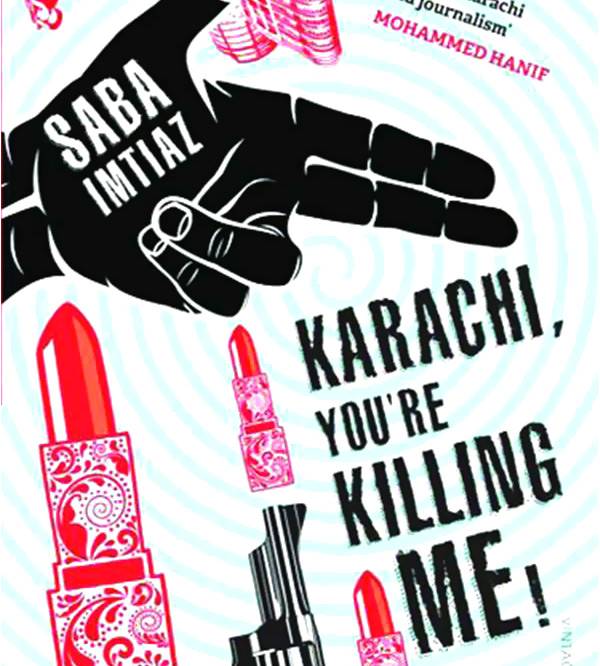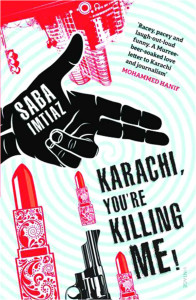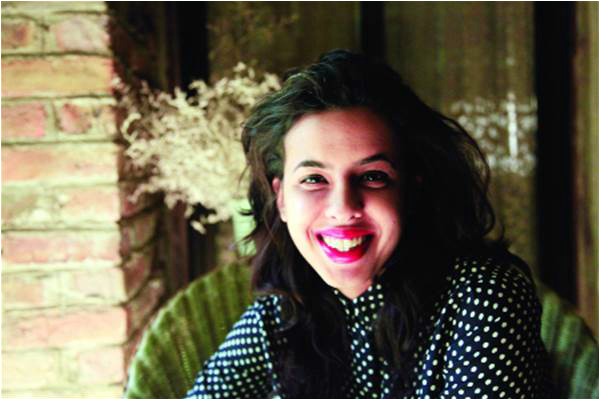
 Full disclaimer, well in advance: I know Saba Imtiaz well. Very well. And this review is not at all going to be influenced by the lingering embarrassment of having confused her with her twin sister for the better part of the first year we knew each other. Honestly, it’s not.
Full disclaimer, well in advance: I know Saba Imtiaz well. Very well. And this review is not at all going to be influenced by the lingering embarrassment of having confused her with her twin sister for the better part of the first year we knew each other. Honestly, it’s not.What it is influenced by though, is the fact that for the first time in goodness knows how long (at least since Moni Mohsin’s last Butterfly hit the printing press), I’ve come across a particularly Pakistani novel, written by an unabashedly Pakistani author, with a particularly Pakistani voice. In Karachi, You’re Killing Me, Ms. Imtiaz has managed to pull together a novel that you want to read and share with people, not because of a misplaced sense of “Oh crap, it’s another Pakistani writer, I suppose I have to be mildly positive”, but instead because it’s actually laugh-out-loud funny, witty, and entertaining.
Karachi, You’re Killing Me is told from the point of view of a young female journalist living in… surprise surprise, Karachi. Ayesha, our protagonist, is a sassy New Woman of the best sort, although undoubtedly, Germaine Greer would have some choice words about her judgement (or lack thereof) of men. Fiercely independent, firmly a member of the economic “middle-class” (insofar as such a state exists in Pakistan) and it would seem perpetually either always drunk or recovering from a hangover, Ayesha’s life consists of a series of run-ins with her clueless, mildly insane, parsimonious employer, or battling with her father’s “real” daughter, the household cat who merits more affection than does she.
Almost always on the verge of bankruptcy, both financial and romantic, Ayesha works for a thinly-veiled caricature of a newspaper, the owner/editor of which is forever finding ways to avoid spending his mega bucks on something as prosaic as employee salaries. Hopping from rickshaws to taxis, and assigned absurd stories to cover, Ayesha is trying to find her way out, not just of her employment dead-end, but also Karachi itself. No luck though - a major romantic entanglement is cut dead by her boyfriend’s snooty mother; her best friends are either impossibly glam or based in Pakistani Nirvana (see: Dubai) and largely inaccessible; and attempts at serious reportage turn into coverage of hysterical, drama-fuelled literature festivals and culture-redefining fashion shows (see also: defying the Taliban through hemlines).
It’s no wonder that Ayesha is setting herself up for a serious case of cirrhosis in the long-term. What will, however, always be a source of wonder should it come to pass, is if Ms. Imtiaz either ever finds future employment in the Pakistani media circus or isn’t the subject of a hit taken out on her by the absolute oodles of real-life individuals who are subject to scathing caricature in the novel. There is almost no one who is spared from her acid observations, some of which verge practically on excoriation, and only avoid tipping over due to the dollops of hilarity in which they’re smothered. The tone of Karachi, You’re Killing Me is little manic, swinging as it does from farce to deathly serious at times, occasionally with greater frequency than one would expect. Stories of failed dates lead into descriptions of bomb blasts; parties are overshadowed by curfews and potential run-ins with ne’er-do-wells; frivolous fashion shows are paired with economic struggles and bouts of self-loathing. The dissonance doesn’t quite hit you until after you’re done reading, but it exists, and despite the fact that Karachi You’re Killing Me is the kind of book you want to tear through in a single sitting, you may put it down with a slight sense of “Hmm. Wait. What’s the resolution? Is there one?”
Ms. Imtiaz is not significantly different from her protagonist (and the ways in which she is are best not put into print, make of that what you will), and if you’ve ever worked as a journalist in Pakistan, you’ll be particularly appreciative of the absurdity of the situations in which Ayesha winds up. Despite seeming more contrived than Baby Bhutto’s nascent identity as a defender of our cultural heritage, let me assure you: they are patently, painfully real. The dichotomy that Ayesha experiences between having morning tea with hitmen in Lyari and dinner at (the somewhat unfairly maligned) Okra is something that will be familiar to many people who have been part of the media circus that passes for “news” in Pakistan.

Photo By Nefer Sehgal
In case any of you are still confused, these are very minor considerations. This is a good book. It’s not a “serious” book in that it doesn’t deal with the twin bugaboos of socio-politics and violence as overtly as many others; nor does it “tackle” issues or concerns of a grave nature (no pun intended). There are certainly flaws, but they’re more cracks than crevices: Ayesha’s narrative is rushed on occasion, and if you’re a reader of any stripe, you’ll probably figure out the ending about halfway through the book. The clear intelligence and poise of the protagonist don’t always gel consistently with her behaviour or attitude; it’s slightly disjointed in flow, and you won’t see a huge amount of innovative prose or manipulation of literary technique that makes the book stand out. But—and this is an important but—Karachi, You’re Killing Me is genuinely funny. It doesn’t cater to an audience, or pretend to be some work of genius. It is, quite simply, what it is: a light read with occasional hints of tragicomedy (which, let’s be real, is hard to avoid in a city with a nature so gloriously twisted that it makes Himmler and Goebbels seem remarkably well-adjusted).
Most readers will probably wonder why there’s any furore about this book; they will say that it’s not “real” literature or shouldn’t be taken “seriously”, but I would argue that this is exactly the sort of tongue-in-cheek, mildly derivative novel of which we need to see more being both written and published. Not because there aren’t enough novels out there with some standard tropes (the oft-overlooked love interest, the bad judgement call hookup etc. etc.), but because as a nation, we’re all so collectively up our own rear ends with “serious”, “political”, “establishment” and security issues that we fail to invoke the surreality and black humour inherent in our circumstances. I mean—and let’s be brutally honest here—I’d rather read another dozen rom-coms of this ilk than sit through one more literary festival addressing the bloody “diaspora” or overwrought-and-still-oddly-tepid tales about terrorism and fundamentalism.
[quote]"There is so much antipathy today toward the idea of fiction existing for pleasure or escapism"[/quote]
Fiction is about experience and encounter; about taking you out of your own head and - horror of horrors - letting you escape into a world of some sort of enjoyment, whatever the source. Everything doesn’t have to be cleverer-than-thou or so serious that you need to pop industrial quantities of Xanax and Prozac just to make it through the first few chapter. The irascible—and also hilarious—Jennifer Weiner commented in a New Yorker interview some weeks ago, that “there is so much antipathy today toward the idea of fiction existing for pleasure or escapism” and she’s not wrong. It’s unlikely that Ms. Imtiaz’s casual prose, loveable heroine and slightly manic plot threads will find favour with literary critics, because let’s be honest: if there isn’t at least some serious blood, gore, and disjointed “soul-searching” or quest for “identity”, the Man Booker judges won’t know what to do with their review copies. This is not a concern for copies you may have of Karachi, You’re Killing Me - you should be buying and giving them out to people, even if only for the fact that it’s somewhat different.
Mohsin Siddiqui survives in Karachi. You can find him on Twitter at @MohsinTS

